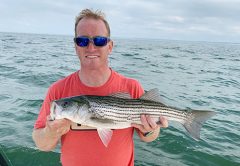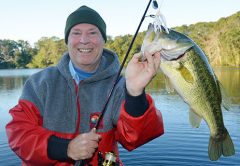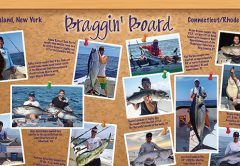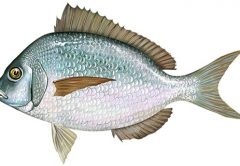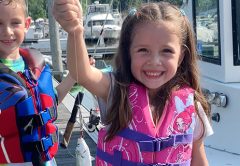It had been blowing, NE 15 to 20, sustained but not crazy, for over 24 hours when the captain called to relay the game plan: “We’ll go take a look at it in the morning,” he’d announced.
I could still hear leaves hissing, branches clattering high in the trees out back—the sounds of meteorological perjury in progress—when I’d finally trudged upstairs to the rack at 2 a.m. On that boat, making weather calls was outside a deck ape’s purview— not that the policy negated my own strong opinions about the wisdom of pushing the weather. No matter what, maintained the skipper, this would be “a little short trip,” a rare half-day September striper trip he’d booked last-minute.
As I rocketed toward Point Judith, RI, two visible flags confirmed that the wind was, indeed, still up. A remote whiff of dread hardened into a mirthless sneer as I cursed the captain, the boat, the port, my chosen occupation, the weather, and the clients who would, no doubt, be waiting on the dock with visions of world record striped bass clogging their skulls—expectations in the stratosphere, fishing odds in the septic tank. After the first 50 or so weather thrashings in a fishing career, the idea of marching headlong into number 51 will make anyone surly at 4 a.m.
Even so, there’s nothing worse than a whiner on deck: Accordingly, I’ve developed a pretty sound poker face which has, in conjunction with some professional competence and a closed mouth on certain mornings, spared me some epic foot-in-mouth moments over years.
As it turned out, our charter was a father and a son. Dad, a sales rep at a successful car dealership and an easy, cheerful presence on the deck, looked to be on the front half of his fifties. His son, 19 years old, seemed to run on a quieter, more serious frequency. After quick intros, we hung docklines and were off.
I’ve always loved father-son trips, the endless variations: Dad overseeing a young boy’s first “deep sea” trip, elderly dads and middle- aged sons playing out life-long family traditions, fathers using a shot at bluefin tuna as a pressure point to insure good behavior from teenage sons. Of the great many I’d witnessed, none had equipped me for that run to Block Island.
We discovered, after pounding through close-stacked chop from the West Gap southa mile or so across shoal water, that seas improved rapidly outside. I climbed the tower to discuss the plan with Cap. Dad, who’d been seated beside him, followed me out on to the bridge deck, and in hushed tones advised me not to take offense if his son seemed a bit aloof—explained the boy had been working through some shit, had stretched himself thin. He stopped there, and I thought it best not to push the point. I vowed to do all I could to give the boy a memorable day and climbed down to the deck.
The son spent most of the crossing leaning into the port- side tower leg in the cockpit, eyes trained on the horizon, seemingly unaffected by hundreds of gallons of green water and airborne spray washing over him.
As I prepped gear, he handled my intermittent small talk with polite detachment; his body language said he’d prefer silence. As the morning wore on, and we (the crew) pulled our hair out trying to find striper one, Dad worked to keep the ball rolling. As the sun climbed a sodden sky, light intensified overhead, and I noted the strain around the son’s eyes— subtle, reflexive winces, middle-distance glaze-overs, shoulders hunched as though they supported a great stone monolith. Here, clearly, was a 19-year- old carrying a terrible weight.
Watching this was obviously killing his Dad, who took care not to let the son catch his concerned glances. Dad had no doubt hoped a day’s fishing might let the two channel an easier time in their lives, and he was putting every ounce of his psychic weight behind the undertaking.
Our time was winding down— it was well after 11 a.m. and into overtime—when the young man tried to strike up a conversation with me, asked a handful of questions about my experiences fishing. I answered with none of my usual sarcasm, spoke freely about the then-recent arrival of my daughter and my own struggle to manage the incessant toggling between killing for a living on deck and nurturing a tiny daughter I was terrified I’d break at any moment. He nodded and pressed several times for clarification or detail, but ultimately fell silent again, eyes clouding over as he resumed his motionless watch over the open ocean to our south.
When he spoke again, it was at a volume I barely registered: “… just got back from Afghanistan…. well, like a week ago….”
Holy shit. Poker face, Zach…
“Whereabouts in Afghanistan?” I blurted out before my brain could intervene.
“Right along the border with Pakistan—Do you know it?” “No—well, vaguely. Not like you must… Not like I should.”
I paused. “That’s crazy, man—I mean, I’m sorry…I mean, thank you… Sorry…ahh, shit….”
Mercifully, my 19-year-old deckmate continued, and in a low voice, began to clue me in: “We were, actually stationed in an area where there’s been quite a bit of Taliban activity—moving weapons, supplies, and so forth into Afghanistan from Pakistan. We’ve been taking fire almost every day—were, I mean…well, still are, actually… .I mean, I’m not…Not now….”
“I get it, man—get what you’re saying, I mean…what I think you mean….” Nice, Zach. I started to apologize and winced (remembering, vaguely, a veteran friend’s advice to me about guilt: Relax, dude, he’d said. It wasn’t you shooting at me) I took a breath. “I mean, I wish you hadn’t had to be there. But thank you for serving, thanks for talking about it.”
He said: “I’m trying not to freak my old man out.”
I’m clearly not helping. Really, what do you say to a 19-year-old kid who’s already seen some legitimately horrific shit—who’s come home to the realization that his friends and family don’t (can’t) begin to understand what he’s just been through, who’s not even sure he can understand it but has to try?
What’s the right thing for the 30-something charterboat mate to say to a kid who has just spent the duration of a morning out on the striper grounds trying to find some shred of perspective or normalcy in the long fetches while he protects his own father from the truth of his situation? “Have you talked to your dad at all?” Not yet. I will. Maybe. Eventually.”
Silence closed in again. Sometimes it all just works out. Before I could resume apologizing— before my head started spinning around 360 degrees on my neck—a trolling rod I’d just cleared of weeds bent down hard, dumping line.
“Fish On!” I yelled, dashing for the rod, then passed it off to the son. Dad dashed out on deck with a big smile, stood beside his son.
Cap turned a few compass points toward the fish to keep the lines straight while the “kid” worked wire back onto the reel and I wound furiously to clear the other rod. Dad offered advice and peppered the boy with encouragement. We were all, I think, thrilled with our new sense of purpose. Five minutes later, I put my left hand on the leader, leaned over the port stern, gaff in my right hand.
“Reel, reel, reel,” I instructed, “Make sure you stay tight now ‘cause she’s right here…” I guided the fish up into range in a clear pocket outside the wash, and took my shot. While father and son held their collective breath, I began to lift the fish—a good one—then paused, pinning her to the transom momentarily.
“Here’s what I wanted to say,” I shouted over my shoulder, turning as I flipped the near-30-pounder aboard and deposited it on deck at the son’s feet with a mighty thud.
Father and son both cracked their first real smiles of a nerve- wracking morning for all involved. As I took the rod back from him, I extended the other hand to shake his.
“Thank you for what you do. And nice fish, dude.”
I wish life—the metrics of pain, of manhood, of guilt, of worry, or isolation—were simple. I wish I could say that one well-timed 30-pound striper solved everything, closed the gulf between a pained father and an exiled son. All too soon, though, the adrenaline cycled through, dissipated, and faces went slack again; as the captain put North Light off the bow, hitched up the rumbling Cummins diesels, the son assumed a new post in the port stern, set his gaze on the longest fetch of open water to our south-southeast. Dad made his way into the cabin and took the only seat that let him see his son. Every mile toward our mainland brought the unsettled reality back into sharper focus. A little more than two hours later, the captain and our two-man charter long since home, and I stretched the last spring line over its cleat, I couldn’t wait to go see my family, try to shake off a growing sense of failure.
A few days later, a son went back to war. A father went back to work. I never saw them again.
Despite its advance billing, that “little short trip” stuck in my brain in a way no other day of deck work ever has. Among other things, it was the first time I had seen the direct, immediate emotional fallout of war in person—and the first time it had ever occurred to me that it is almost always young men who are left to carry it through life. It was also the first time I watched a man so young work so hard to protect his father from the true nature and extent of that suffering.
I have spent the intervening years reading, researching, and discussing this nation’s wars, and what we ask of those who step forward to serve our country around the globe. In the same way I so desperately wanted to do a small solid for that young man years back, I have spent years trying to find ways I might do something to help the growing number of young men coming home from combat deployments injured in a multitude of ways. It has been only in the last few weeks, as of this writing, that I’ve come to a realization that I’ve been looking at these issues wrong—that, on some level, I had all the answers I needed that fateful September morning years back. Often, the discussion among those who have not served is the ways the government, the military— the “system”—has failed the ones who have given the most. But more recently, I’m seeing that when people speak of those who have “fallen through the cracks” of that system, it may well have more to do with a failure within our own communities. Too often, we leave our wounded to the various agencies or specialists who have frontline responsibility for their care. We have heard the generic advice about the ways we ought to act around those who have served—that we mustn’t presume to understand the particulars of their experience. At the risk of getting it wrong—these are, after all, only the musings of one deck ape, 4-F and combat-useless—I think we at “home” will do considerably better by those who have made such sacrifices if we resolve to keep lines of communication open with all our neighbors, to hang in there with them through the stammering and the awkward silences, to beg their forgiveness when we get it wrong. To thank our warriors for their service, then take it a step further, show some love, some human warmth every day through the small kindnesses, all the small and seemingly insignificant gestures that amount to our humanity, and what makes home, home—no matter where you’re coming home from.
In the meantime, we’d like to thank all who serve, and have served, and to all those still out in the thick of it, stay safe, do what you need to do, and get back here: There are fish need catching….




